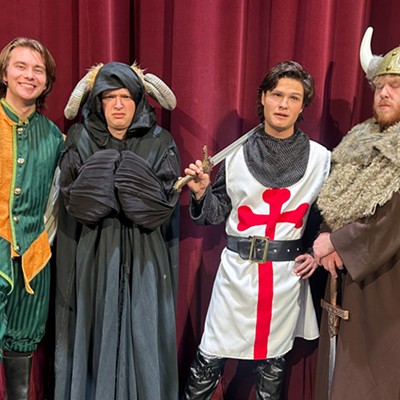One hundred years ago, the annual Spokane Tribal Labor Day Celebration was engendered as the Wellpinit Fair. It was called such because the idea of a fully fledged "powwow" seemed too loaded at a time when assimilation, not diversity, was the watchword.
There were some saddling and horse-driving events, some hasty exhibits and food from nearby gardens; but there weren't the activities and rituals that one might expect. There was no dancing, that poetry of movement so closely linked with Native American tribute and expression. There was no stickgame, an ancient team-based competition of chanting and chance that once held stakes of land and livestock.
"It's changed a lot," says Spokane Tribal Councilwoman Carol Evans. "A long time ago, you didn't have the contesting. It was more that we came together to share, to see people that we hadn't seen. In fact, when the powwow first started back in 1914, we were still adjusting to being moved to the reservation, and at that time we weren't allowed to continue to practice our culture, but the Indian Agency allowed us to have a fair. And then through the years we were eventually allowed to start bringing back our culture."
A century on, the weekend-long event is still evolving. Along with site improvements to better accommodate the participants, the rowdier side of the powwow that alienated Arnold Spirit, Jr., the semi-autobiographical narrator of Sherman Alexie's novel The Absolutely True Diary of a Part-Time Indian, has been openly addressed by the organizers.
"It's real important for us to acknowledge that we are alcohol and drug free," says Evans. "You'll see a lot of powwows do this. It's actually focused on family now."
In early 2013, the event lost an important figure: internationally renowned artist George Flett, who was a sponsor of the unique Prairie Chicken Dance. The all-male dance, which incorporates gestures from the bird's mating rituals, was a popular theme in Flett's artwork.
"He's no longer with us, but we are continuing to offer the Prairie Chicken as a category in one of our contests. It's really cool; it's really something to see. With certain dances, it's to the level of being spiritual. You're able to bring your spiritual self out," says Evans.
Although the powwow has never managed an accurate head count, this year's centennial is expected to draw an even bigger crowd than in years past.
"This year we have a lot of what they call 'specials' — individuals [who] haven't danced in a long time and are coming back to join the dancing circle. We also have some name-giving and some memorial-type specials. We'll have maybe 30 drums, and you might have five drummers on one drum; and then we can have anywhere from 400 to 800 dancers throughout the weekend," she says.
Evans says that symbolizes the powwow's spirit of sharing. Native and non-Native guests aren't just welcome; they're welcome to join in. That kind of experience conveys an "understanding of what we're about — our culture and our traditions, that we have a value system where ... we honor our youth and we honor our elders, that we value life and everything about it. This is all part of that." ♦
Spokane Tribe of Indians 100th Annual Labor Day Celebration and Powwow • Aug. 28-Sept. 1 • Spokane Indian Reservation, Wellpinit, Wash. • spokanetribe.com





















